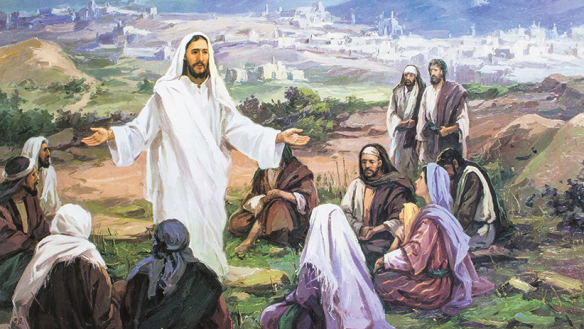DAILY MEDITATION: "Master, to whom shall we go? You have the words of eternal life”
Liturgical day: Twenty-first Sunday in Ordinary Time (B)
 Gospel text (Jn 6,60-69): Many of Jesus' disciples who were listening said, "This saying is hard; who can accept it?" Since Jesus knew that his disciples were murmuring about this, he said to them, "Does this shock you? What if you were to see the Son of Man ascending to where he was before? It is the spirit that gives life, while the flesh is of no avail. The words I have spoken to you are Spirit and life. But there are some of you who do not believe." Jesus knew from the beginning the ones who would not believe and the one who would betray him. And he said, "For this reason I have told you that no one can come to me unless it is granted him by my Father."
Gospel text (Jn 6,60-69): Many of Jesus' disciples who were listening said, "This saying is hard; who can accept it?" Since Jesus knew that his disciples were murmuring about this, he said to them, "Does this shock you? What if you were to see the Son of Man ascending to where he was before? It is the spirit that gives life, while the flesh is of no avail. The words I have spoken to you are Spirit and life. But there are some of you who do not believe." Jesus knew from the beginning the ones who would not believe and the one who would betray him. And he said, "For this reason I have told you that no one can come to me unless it is granted him by my Father."
As a result of this, many of his disciples returned to their former way of life and no longer accompanied him. Jesus then said to the Twelve, "Do you also want to leave?" Simon Peter answered him, "Master, to whom shall we go? You have the words of eternal life. We have come to believe and are convinced that you are the Holy One of God."
"Master, to whom shall we go? You have the words of eternal life”
Fr. Miquel VENQUE i To
(Solsona, Lleida, Spain)
Today the Gospel places us in Capernaum, where Jesus is followed by many after witnessing his miracles, especially the spectacular multiplication of the loaves. Socially, Jesus runs the risk of dying of success there, as is often said; they even want to name him king. This is a key moment in the catechesis of Jesus. It is the moment in which he begins to clearly explain the supernatural dimension of his message. And, as Jesus is such a good catechist, a perfect priest, the best bishop and pope, he lets them go, He feels sorrow, but He is faithful to his message; popular success does not blind him.
A great priest used to say that, throughout the history of the Church, people who seemed to be indispensable pillars have fallen: they “returned to their former way of life and no longer accompanied him” (Jn 6, 66). You and I can fall, “disregard,” leave, criticize, “do our own thing.” With humility and confidence, let us tell good Jesus that we want to be faithful to Him today, tomorrow and every day; may He show us how little evangelical sense it makes to debate the teachings of God or the Church because “I do not understand them”: “Master, to whom shall we go?” (Jn 6, 68). Let us ask for more supernatural sense. Only in Jesus and within his Church do we find the Word of eternal life: “You have the words of eternal life” (Jn 6, 68).
Like Peter, we know that Jesus speaks to us in a supernatural language, a language that we must tune correctly to understand fully; otherwise, we only hear incoherent and unpleasant noises; it must be fine-tuned. Like Peter, in our life as Christians we also have moments in which we must renew and show that we are in Jesus and that we want to remain in Him. Peter loved Jesus Christ, that is why he stayed; the others wanted him for the bread, for the “candy”, for political reasons... and they left him. The secret of faithfulness is to love, to trust. Let us ask Virgo fidelis, the faithful Virgin, to help us today and now to be faithful to the Church that we have.
Source: evangeli.net
